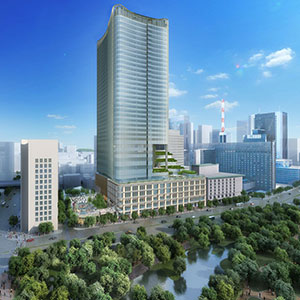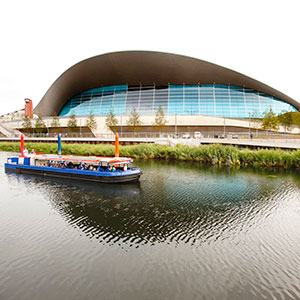Driven by a relatively strong economy and positive sentiment associated with upcoming sporting events, Japan’s real estate market is drawing in more investment from abroad, particularly to Tokyo. Moreover, the country lacks the kinds of barriers to such investment that already exist or are springing up in other countries.
That said, the market situation is by no means static: for those looking to benefit from real estate, a variety of locations and asset types offer a choice of prospective returns.
A case in point is Tokyo’s office market, which has remained tight in recent years. Rents broadly have been growing and vacancy rates, although having increased slightly in 2016, are still well below the most recent peaks of 2012.
These factors have, in turn, attracted private funds and foreign investors to the office market, according to Toyokazu Imazeki, chief analyst at Sanko Estate Co., Ltd. But the situation is expected to change.
“It’s in pretty good condition right now from the viewpoint of landlords”, Imazeki said. “The supply and demand conditions are quite tight and the vacancy rate is quite low, and demand is strong because of the condition of the economy”.
However, he noted that more office space is expected to come on to the market in 2018 and 2020, which is likely to increase the vacancy rate and make the situation more competitive.
“That supply may change the market conditions from a landlord’s market to an occupier’s market. That means oversupply”, the analyst pointed out.
Such a situation is a problem for any asset class, and means that owners have to work harder to ensure that their property stands out in a saturated market.
“Vacancy risk is the biggest risk that investors always fear”, said Tsuyoshi Sato, chief of the global team at Premium Value Bank Co. Ltd. “However, you are able to minimise the risk by having a trusted, hard-working property management company. And this is the unique part of real estate investment compared with other investment—you are able to control the situation”.
Finding a home
In this respect, residential real estate has enduring appeal for some foreign investors owing to its typically smaller scale and, thus, manageability.
“The most basic type of investment is single unit apartments in central Tokyo for rental income, particularly in the second-hand market where yields are better”, said Lloyd Danon, managing director of Argentum Wealth Management. “A growing population and tight labour market mean high occupancy rates.
“Cheap financing is widely available, and this combined with reasonable property values—especially when compared with other major cities such as Hong Kong, Singapore, London and so on—means that investors can enjoy good cash flow and returns from their properties”, he added.
Yields in this area can exceed those found in other markets. According to Imazeki, for office leasing these would typically be less than 4% for class A offices in Tokyo.
“Once you look outside central Tokyo locations, yields improve and it is not uncommon to see gross yields of 8–10% on whole residential buildings”, said Danon.
Meanwhile, the explosion of inbound tourism to Japan has driven interest in another asset class—hotels. According to the Japan National Tourism Organization, 21mn foreign tourists visited Japan between January and September this year, an increase of 18.9% over the same period last year. Further growth is anticipated, not least because of upcoming global sporting events such as the 2019 Rugby World Cup and the Tokyo 2020 Olympic and Paralympic Games. And those people will need places to stay.
In September, UBS Asset Management Group announced that it would launch a $400mn fund with Mitsubishi Corporation to invest in hotels, with the firm seeking to take advantage of the gap between supply and demand—in 2016, the number of hotels only increased 1.34% from the year before, according to Ministry of Health, Labour and Welfare figures. In particular, the firm is targeting investment in limited-service hotels: budget friendly establishments that offer the minimum in services.
“Large investors—funds, corporates and very wealthy people—are interested in hotels, as everybody knows that more tourists from overseas are coming to Japan”, said Tsuyoshi Hikichi, managing director of Axios Management Inc.
Helping to drive the growth in tourism-related real estate is the anticipated approval for the construction of casinos, or integrated resorts as they are typically referred to in Japan. A law was passed last year legalising such resorts, but further legislation is required.
Firms such as MGM Resorts International and Las Vegas Sands Corporation are eyeing investments that could run into billions of dollars. Further economic benefits once the resorts are opened are anticipated, too.
“If people are coming and spend money, the real estate market should see a general upward trend”, Hikichi noted, adding that this applied to residential and commercial real estate as well, not just hotels.
Good management
For foreign investors, there is a question of how they can access these more interesting areas of Japanese real estate. As Sato says, “being able to get financed by Japanese bank facilities is very important. Your annual income, length of stay in Japan, length of employment and type of visa—every factor will be screened by banks”.
And once financing is acquired, if necessary, proper planning is required when it comes to managing subsequent income.
“Investors can gain from tax advantages with property in Japan, such as writing down acquisition costs from their income for that year, and using property depreciation to offset taxes on rental income”, said Danon. “However these advantages will work differently depending on the investor’s situation. For example, for some investors it is better to hold a property through a company structure rather than as an individual, and vice versa”.
A further consideration for foreign investors is the exchange rate. With the pound moving closer to the level seen against the yen before the EU referendum in 2016, British investors might judge that now is a better time for them to make their move.
“The yen is not too strong, so it may be a good time for foreign investors to consider investments in this market”, said Imazeki.







